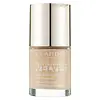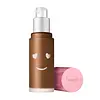What's inside
What's inside
 Key Ingredients
Key Ingredients

 Benefits
Benefits

 Concerns
Concerns

 Ingredients Side-by-side
Ingredients Side-by-side

Water
Skin ConditioningMethyl Trimethicone
Skin ConditioningDimethicone
EmollientSilica
AbrasiveCI 77891
Cosmetic ColorantAlcohol
AntimicrobialPEG-9 Polydimethylsiloxyethyl Dimethicone
EmulsifyingButylene Glycol
HumectantIsododecane
EmollientPentylene Glycol
Skin ConditioningCI 77492
Cosmetic ColorantGlycerin
HumectantPEG/PPG-18/18 Dimethicone
EmulsifyingDimethicone/PEG-10/15 Crosspolymer
Sodium Chloride
MaskingBambusa Arundinacea Stem Extract
Skin ConditioningParfum
MaskingTapioca Starch
CI 77491
Cosmetic ColorantCI 77499
Cosmetic ColorantAluminum Hydroxide
EmollientDisteardimonium Hectorite
StabilisingTriethoxycaprylylsilane
Ethylhexylglycerin
Skin ConditioningTocopheryl Acetate
AntioxidantPropylene Carbonate
SolventDisodium EDTA
Hydroxyethyl Urea
HumectantCaprylic/Capric Triglyceride
MaskingSynthetic Fluorphlogopite
Dipropylene Glycol
HumectantKalanchoe Pinnata Leaf Extract
MaskingMarrubium Vulgare Extract
Skin ConditioningAlgin
MaskingPhenoxyethanol
PreservativeSodium Citrate
BufferingCitric Acid
BufferingAcacia Senegal Gum
MaskingPhenethyl Alcohol
MaskingFurcellaria Lumbricalis Extract
Skin ConditioningSodium Benzoate
MaskingArbutus Unedo Fruit Extract
AntioxidantPotassium Sorbate
PreservativeTocopherol
AntioxidantLapsana Communis Flower/Leaf/Stem Extract
Skin ConditioningMaris Sal
Skin ConditioningWater, Methyl Trimethicone, Dimethicone, Silica, CI 77891, Alcohol, PEG-9 Polydimethylsiloxyethyl Dimethicone, Butylene Glycol, Isododecane, Pentylene Glycol, CI 77492, Glycerin, PEG/PPG-18/18 Dimethicone, Dimethicone/PEG-10/15 Crosspolymer, Sodium Chloride, Bambusa Arundinacea Stem Extract, Parfum, Tapioca Starch, CI 77491, CI 77499, Aluminum Hydroxide, Disteardimonium Hectorite, Triethoxycaprylylsilane, Ethylhexylglycerin, Tocopheryl Acetate, Propylene Carbonate, Disodium EDTA, Hydroxyethyl Urea, Caprylic/Capric Triglyceride, Synthetic Fluorphlogopite, Dipropylene Glycol, Kalanchoe Pinnata Leaf Extract, Marrubium Vulgare Extract, Algin, Phenoxyethanol, Sodium Citrate, Citric Acid, Acacia Senegal Gum, Phenethyl Alcohol, Furcellaria Lumbricalis Extract, Sodium Benzoate, Arbutus Unedo Fruit Extract, Potassium Sorbate, Tocopherol, Lapsana Communis Flower/Leaf/Stem Extract, Maris Sal
Water
Skin ConditioningMethyl Trimethicone
Skin ConditioningAlcohol
AntimicrobialIsododecane
EmollientPhenyl Trimethicone
Skin ConditioningPEG-9 Polydimethylsiloxyethyl Dimethicone
EmulsifyingTitanium Dioxide
Cosmetic ColorantEthylhexyl Methoxycinnamate
UV AbsorberAcrylates/Dimethicone Copolymer
Skin ConditioningDiphenyl Dimethicone/Vinyl Diphenyl Dimethicone/Silsesquioxane Crosspolymer
Glycerin
HumectantDimethiconol/Methylsilanol/Silicate Crosspolymer
Silica
AbrasiveAluminum Hydroxide
EmollientDimethicone
EmollientPhenoxyethanol
PreservativeSynthetic Fluorphlogopite
Stearic Acid
CleansingSodium Myristoyl Glutamate
CleansingGlyceryl Undecyl Dimethicone
Disteardimonium Hectorite
StabilisingVp/Va Copolymer
Silica Silylate
EmollientPropylene Carbonate
SolventSodium Metabisulfite
AntioxidantSodium Tocopheryl Phosphate
AntioxidantHyaluronic Acid
HumectantHydrogen Dimethicone
Sodium Hyaluronate
HumectantBHT
AntioxidantHibiscus Sabdariffa Flower Extract
Skin ConditioningCI 77163
Cosmetic ColorantIron Oxides
CI 77891
Cosmetic ColorantWater, Methyl Trimethicone, Alcohol, Isododecane, Phenyl Trimethicone, PEG-9 Polydimethylsiloxyethyl Dimethicone, Titanium Dioxide, Ethylhexyl Methoxycinnamate, Acrylates/Dimethicone Copolymer, Diphenyl Dimethicone/Vinyl Diphenyl Dimethicone/Silsesquioxane Crosspolymer, Glycerin, Dimethiconol/Methylsilanol/Silicate Crosspolymer, Silica, Aluminum Hydroxide, Dimethicone, Phenoxyethanol, Synthetic Fluorphlogopite, Stearic Acid, Sodium Myristoyl Glutamate, Glyceryl Undecyl Dimethicone, Disteardimonium Hectorite, Vp/Va Copolymer, Silica Silylate, Propylene Carbonate, Sodium Metabisulfite, Sodium Tocopheryl Phosphate, Hyaluronic Acid, Hydrogen Dimethicone, Sodium Hyaluronate, BHT, Hibiscus Sabdariffa Flower Extract, CI 77163, Iron Oxides, CI 77891
Ingredients Explained
These ingredients are found in both products.
Ingredients higher up in an ingredient list are typically present in a larger amount.
Alcohol comes in many different forms. Different types of alcohol will have different effects on skin. This ingredient is usually an astringent alcohol.
These alcohols are drying on the skin. They may strip away your skin's natural oils and even damage your skin barrier. Astringent alcohols may also irritate skin.
Other types of astringent alcohols include:
According to the National Rosacea Society based in the US, you should be mindful of products with these alcohols in the top half of ingredients.
Any type of sanitizing product will have high amounts of alcohol to help kill bacteria and viruses.
Fatty alcohols come from plant oils such as coconut oil. These can help hydrate the skin and are non-irritating. Some fatty alcohols include cetyl and stearyl alcohol.
Learn more about AlcoholAluminum Hydroxide is a form of aluminum. It can be naturally found in nature as the mineral gibbsite. In cosmetics, Aluminum Hydroxide is used as a colorant, pH adjuster, and absorbent.
As a colorant, Aluminum Hydroxide may add opacity, or reduce the transparency. Aluminum hydroxide is contains both basic and acidic properties.
According to manufacturers, this ingredient is an emollient and humectant. This means it helps hydrate the skin.
In medicine, this ingredient is used to help relieve heartburn and help heal ulcers.
There is currently no credible scientific evidence linking aluminum hydroxide in cosmetics to increased cancer risk.
Major health organizations allow the use of aluminum hydroxide in personal care products and have not flagged it as a carcinogenic risk at typical usage levels.
Learn more about Aluminum HydroxideCi 77891 is a white pigment from Titanium dioxide. It is naturally found in minerals such as rutile and ilmenite.
It's main function is to add a white color to cosmetics. It can also be mixed with other colors to create different shades.
Ci 77891 is commonly found in sunscreens due to its ability to block UV rays.
Learn more about CI 77891Dimethicone is a type of synthetic silicone created from natural materials such as quartz.
What it does:
Dimethicone comes in different viscosities:
Depending on the viscosity, dimethicone has different properties.
Ingredients lists don't always show which type is used, so we recommend reaching out to the brand if you have questions about the viscosity.
This ingredient is unlikely to cause irritation because it does not get absorbed into skin. However, people with silicone allergies should be careful about using this ingredient.
Note: Dimethicone may contribute to pilling. This is because it is not oil or water soluble, so pilling may occur when layered with products. When mixed with heavy oils in a formula, the outcome is also quite greasy.
Learn more about DimethiconeDisteardimonium Hectorite comes from the clay mineral named hectorite. It is used to add thickness to a product.
It can also help stabilize a product by helping to disperse other ingredients.
Hectorite is a rare, white clay mineral.
Learn more about Disteardimonium HectoriteGlycerin is already naturally found in your skin. It helps moisturize and protect your skin.
A study from 2016 found glycerin to be more effective as a humectant than AHAs and hyaluronic acid.
As a humectant, it helps the skin stay hydrated by pulling moisture to your skin. The low molecular weight of glycerin allows it to pull moisture into the deeper layers of your skin.
Hydrated skin improves your skin barrier; Your skin barrier helps protect against irritants and bacteria.
Glycerin has also been found to have antimicrobial and antiviral properties. Due to these properties, glycerin is often used in wound and burn treatments.
In cosmetics, glycerin is usually derived from plants such as soybean or palm. However, it can also be sourced from animals, such as tallow or animal fat.
This ingredient is organic, colorless, odorless, and non-toxic.
Glycerin is the name for this ingredient in American English. British English uses Glycerol/Glycerine.
Learn more about GlycerinIsododecane is a fragrance, emollient, and solvent.
As an emollient, it helps your skin stay soft and hydrated. Emollients help trap moisture into your skin.
Isododecane's role as a solvent makes it a great texture enhancer. It spreads smoothly on skin and does not leave a sticky feeling behind. Isododecane also helps prevent color transfer in makeup products.
Isododecane is not absorbed into skin.
Learn more about IsododecaneMethyl Trimethicone is a type of silicone. It is a solvent and emulsifier.
Solvents are used to keep ingredients together in a product. They can help dissolve ingredients to stable bases or help evenly distribute ingredients throughout the product.
Emulsifiers help stabilize a product. It does this by preventing certain ingredients from separating.
Methyl Trimethicone does not get absorbed into the skin.
Learn more about Methyl TrimethiconePEG-9 Polydimethylsiloxyethyl Dimethicone is a type of silicone.
Phenoxyethanol is a preservative that has germicide, antimicrobial, and aromatic properties. Studies show that phenoxyethanol can prevent microbial growth. By itself, it has a scent that is similar to that of a rose.
It's often used in formulations along with Caprylyl Glycol to preserve the shelf life of products.
This ingredient is a solvent. It helps dissolve active ingredients and alter the texture of products.
Propylene Carbonate is commonly used in makeup and with clay, such as montmorillonite or bentonite.
Studies show this ingredient to be safe for cosmetics. When it is undiluted, it can cause skin irritation. (It is always diluted in skincare and makeup). This ingredient is water-soluble.
Propylene Carbonate is created from propylene glycol and carbonic acid.
Learn more about Propylene CarbonateSilica, also known as silicon dioxide, is a naturally occurring mineral. It is used as a fine, spherical, and porous powder in cosmetics.
Though it has exfoliant properties, the function of silica varies depending on the product.
The unique structure of silica enhances the spreadability and adds smoothness, making it a great texture enhancer.
It is also used as an active carrier, emulsifier, and mattifier due to its ability to absorb excess oil.
In some products, tiny microneedles called spicules are made from silica or hydrolyzed sponge. When you rub them in, they lightly polish away dead skin layers and enhance the penetration of active ingredients.
Learn more about SilicaSynthetic Fluorphlogopite is the synthethic version of mica. It consists of fluorine, aluminum and silicate.
Synthetic Fluorphlogopite is used to add volume to products.
It is considered non-irritating on the skin.
Learn more about Synthetic FluorphlogopiteWater. It's the most common cosmetic ingredient of all. You'll usually see it at the top of ingredient lists, meaning that it makes up the largest part of the product.
So why is it so popular? Water most often acts as a solvent - this means that it helps dissolve other ingredients into the formulation.
You'll also recognize water as that liquid we all need to stay alive. If you see this, drink a glass of water. Stay hydrated!
Learn more about Water